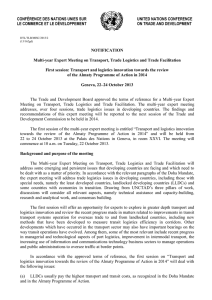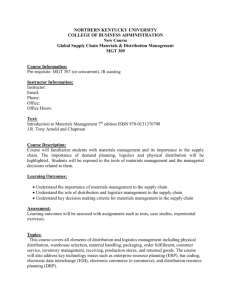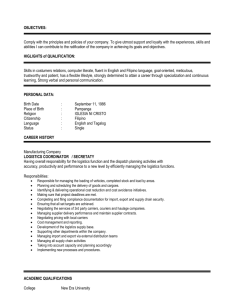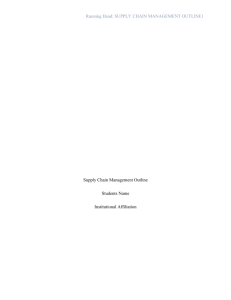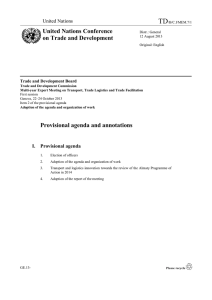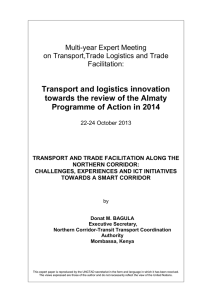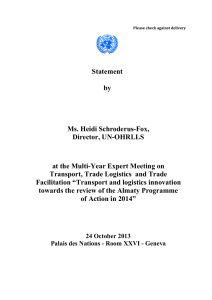Multiyear Expert Meeting on Transport, Trade Logistics and Trade Facilitation
advertisement
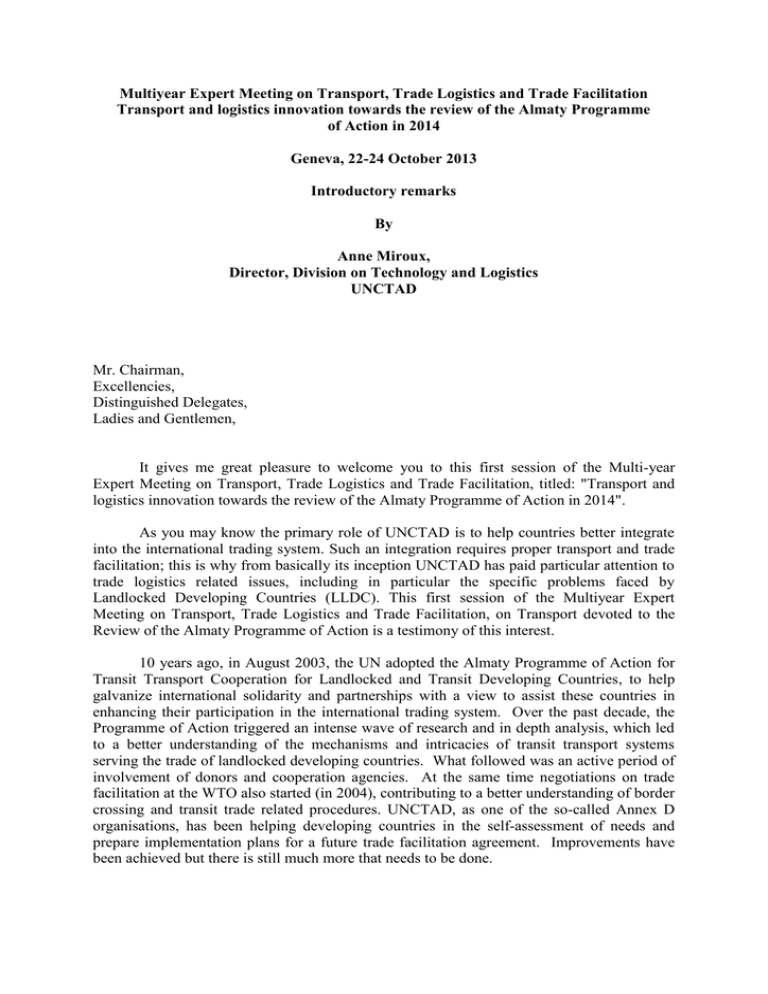
Multiyear Expert Meeting on Transport, Trade Logistics and Trade Facilitation Transport and logistics innovation towards the review of the Almaty Programme of Action in 2014 Geneva, 22-24 October 2013 Introductory remarks By Anne Miroux, Director, Division on Technology and Logistics UNCTAD Mr. Chairman, Excellencies, Distinguished Delegates, Ladies and Gentlemen, It gives me great pleasure to welcome you to this first session of the Multi-year Expert Meeting on Transport, Trade Logistics and Trade Facilitation, titled: "Transport and logistics innovation towards the review of the Almaty Programme of Action in 2014". As you may know the primary role of UNCTAD is to help countries better integrate into the international trading system. Such an integration requires proper transport and trade facilitation; this is why from basically its inception UNCTAD has paid particular attention to trade logistics related issues, including in particular the specific problems faced by Landlocked Developing Countries (LLDC). This first session of the Multiyear Expert Meeting on Transport, Trade Logistics and Trade Facilitation, on Transport devoted to the Review of the Almaty Programme of Action is a testimony of this interest. 10 years ago, in August 2003, the UN adopted the Almaty Programme of Action for Transit Transport Cooperation for Landlocked and Transit Developing Countries, to help galvanize international solidarity and partnerships with a view to assist these countries in enhancing their participation in the international trading system. Over the past decade, the Programme of Action triggered an intense wave of research and in depth analysis, which led to a better understanding of the mechanisms and intricacies of transit transport systems serving the trade of landlocked developing countries. What followed was an active period of involvement of donors and cooperation agencies. At the same time negotiations on trade facilitation at the WTO also started (in 2004), contributing to a better understanding of border crossing and transit trade related procedures. UNCTAD, as one of the so-called Annex D organisations, has been helping developing countries in the self-assessment of needs and prepare implementation plans for a future trade facilitation agreement. Improvements have been achieved but there is still much more that needs to be done. Indeed, in spite of progress made, delays at border crossings and ports due to cumbersome procedures; poor transport infrastructure or inefficient logistics services remain a significant burden for many LLDCs. This is one of the reason why, in March 2012, the General Assembly of the United Nations adopted resolution 66/214, in which it decided to hold a comprehensive Ten-Year Review Conference of the Almaty Programme of Action in 2014. In compliance with this resolution and under the aegis of UNOHRLLs, over 2013, different development partners, including several UN system agencies and international financing institutions, have engaged with representatives of landlocked developing countries and transit countries in the review of progress made in implementing the priority areas defined in the APoA. These encompass measures to assist in integrating LLDCs into the world economy. Such a world wide process is aimed at identifying major achievements and constraints encountered as well as recommendations on actions and initiatives that will feed into the future development agenda for LLDCs. It is in this context that a number of meetings have been organized this year, such as the Euro-Asian Regional Review of the Almaty Programme of Action in Vientiane, Lao PDR (March 2013); the Africa Regional Review of the Almaty Programme of Action in Addis Ababa, Ethiopia (July 2013) and more recently, last month, the 12th Annual Ministerial Meeting of the Group of Landlocked Developing Countries held in New York. The global review process will soon be completed with the Latin America Regional Review of the Almaty Programme of Action, to be held in Asuncion, Paraguay, in November. This first session of the Multiyear Expert Meeting on Transport, Trade Logistics and Trade Facilitation, is the contribution of UNCTAD to this review process. As the issues note prepared by the Secretariat for this expert meeting indicates, the main impediments faced by LLDCs in accessing overseas markets have been well documented. These obstacles may be physical, in terms of remoteness from world overseas partners, and operational, in terms of dependence upon trade and transport facilities and services in neighbouring coastal countries. The degree to which both types of obstacles affect LLDCs trade competitiveness depend in turn on institutional, regulatory and technological factors. The improvement of transit transport systems should be geared towards a single and clear objective: removing all possible obstacles to enable the access of landlocked countries to logistics systems at least equivalent to those that their counterparts in coastal countries enjoy. The aim is clear and straightforward; yet there are many dimensions to the improvement of transit logistics chains. Ladies and Gentlemen, To improve transit logistic systems, a number of issues need to be examined. The present meeting will enable us to consider a number of them, (including for instance transit development transport policies, transport corridors, and the possibilities for improvement offered by technology and innovation - especially ICT) and provide the opportunity to share experiences and knowledge, as well as identify best practices. Let me mention in that respect some of the questions the meeting may want to consider. These include for instance: 2 How can more efficient, predictable and cost-effective transit logistics enable producers in landlocked countries to enter and participate more effectively in global and regional value chains? How to establish comprehensive and consistent national and regional transit policies that include regulatory frameworks ensuring market access to transport and logistics services. How can regional integration organizations and development partners help ensure that new institutional schemes foster technological innovation and easier access to the most efficient services. How can innovation and technology policies support the implementation of logistics and transit policies? Lastly, how can technology - and what kind of technology - help in ensuring that the trade of landlocked countries is treated the same way as any other cargo travelling along a transport corridor or passing through a port. In close connection with the issues raised in this note, expert deliberations may also benefit from the outcomes of the above-mentioned regional review meetings for Asia and Central Asia held in Vientiane on 5–7 March 2013, and, in Addis Ababa on 16–18 July 2013 for the African region, as part of the 10-year review of the implementation of the Almaty Programme of Action. Ladies and gentlemen, Let me conclude by reaffirming that UNCTAD's strong commitment to assist in developing a new development agenda for LLDCs in matters relating to transit transport and logistics innovation and to contribute to the review of the Almaty Programme of Action in 2014. I trust your deliberations, here, over these next three days, will constitute a significant step in that direction. Thank you for your attention. 3
